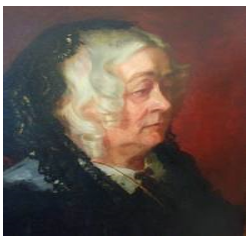| Introductory Information | |
| Character’s Name | Elizabeth Palmer Paebody |
| Birth–Death Years | 16th May 1804-3rd January 1894 |
| Picture of Character: Find a digital photo of the individual and paste it here. |  |
| Most Noted For | Pioneering kindergarten education |
| Character Profile Report | |
| Biographical Information: Include life experiences that impacted thoughts and impact on education. | Elizabeth Palmer Paebody was an American born in Massachusetts in a family of a physician and a housewife. Palmer had an opportunity to acquire formal education and even established a school in Boston. Through the teaching career, Palmer became the founder of Kindergarten education institution in the US. While still in Boston, Palmer became an assistant teacher alongside Mr. Alcott, who established an experimental temple school targeting children. The experience within this school enabled Palmer to publish the famous Record of a School plan. This piece of literature outlined the planning of the school environment as part of early childhood education. Notably, Palmer’s experiences at the temple school enabled her to be the first American to create a plan for schooling children below the age of six years in 1860. Before this, most of the early childhood education models were from Germany. Through her contributions in the Kindergarten Messengermagazine and the creating of an ideal learning environment for young children, Palmer’s efforts resulted in the establishment of kindergarten as an educational institution in the US (Ronda, 2001). |
| Historical/Political Context: Explain the broader historical events that shaped the character’s era. This is not about the person’s accomplishments. | During the early years of her career as a teacher, Palmer was introduced to the early childhood education environment, which depended on learning models from Germany. Besides, the temple school controlled by Alcott had an interesting childhood education philosophical inclination. The transcendental movement was at its peak in the US. Palmer, being one of the most prominent figures within the movement, was influenced by the urgent need to establish an early childhood education program for children below the age of six years (Gura, 2007). |
| Beliefs on Education: Describe what thoughts were promoted about education. | During her lifetime, Palmer was a proficient writer who published several books on early childhood education and transcendentalism. Besides, Palmer published the Record of a Schoolwriting. In this education plan, Palmer expressed her thoughts that “truth came not only from intellectual learning but also from nurturing the non-rational, intuitive powers as well” (Ronda, 2001, p. 35). Palmer believed that imparting basic skills in the minds of the young learners could make a difference in their view of formal and informal education. As part of the kindergarten program developed by Palmer, the component of the early childhood education model “sought to combine rigorous training in academic subjects with efforts to draw out and shape students’ moral natures” (Gura, 2007, p. 24). |
| Impact on Education:How did this person’s beliefs and actions affect education? | Through the thoughts and writings of Palmer on early childhood education and transcendentalism, the kindergarten became an official educational institution following its approval by the congress in 1897. Besides, Palmer’s early childhood education plan is still being used to internalize other elements of learning, such as moral values, tidiness, and disciple among young learners. In addition, Palmer’s publications, such as the Kindergarten Culture, Letters to Kindergarteners, andLectures in the Training Schools for Kindergartners, among others, have remained relevant in the field of early childhood education, despite having been published more than a century ago (Warren, 2002). |
| Others’ Criticisms: Summarize the criticisms of contemporaries, historians, and scholars. | Among the most vocal critics of Palmer include Henry James. In the book, The Bostonians, Henrycriticized some of Palmer’s thoughts as outdated and confined to the ideals of transcendentalism. Besides, Henry described Palmer as impractical in her definition of the scope of early childhood education (Gura, 2007). |
| Your Critique: What ideas or actions do you support or reject? | The works of Palmer and her actions towards improving the scope of early childhood education led to the establishment of kindergarten as a legal education institution. In my opinion, Palmer lived ahead of her time. She created a comprehensive and simple to implement an education plan that fits within the transcendental culture of America. |
| Reference List | |
| List at least 3 references using proper APA format. | Gura, P. (2007). American Transcendentalism: A History. New York, NY: Hill and Wang. Ronda, B. (2001). Elizabeth Palmer Peabody: A Reformer On Her Own Terms.Cambridge, UK: Harvard UP. Warren, J. (2002). Culture of Eloquence.University Park, New York: Penn State UP. |